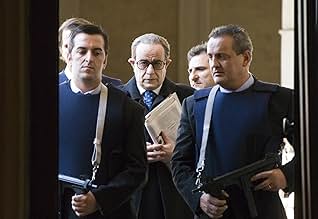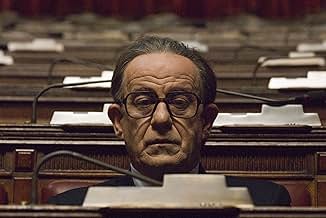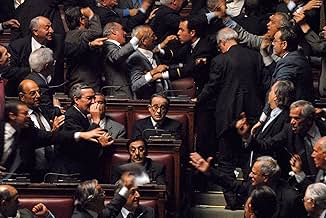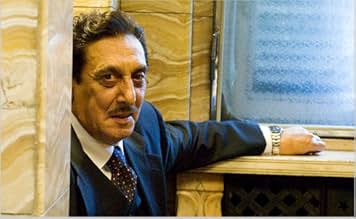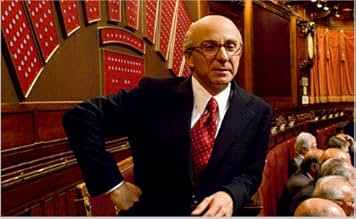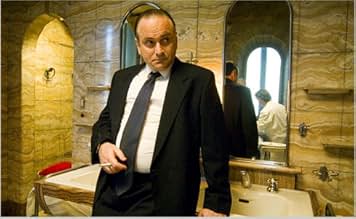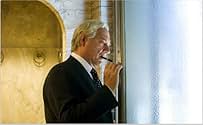Il divo
- 2008
- Tous publics
- 1h 50m
IMDb RATING
7.2/10
20K
YOUR RATING
The story of Italian politician Giulio Andreotti, who has served as Prime Minister of Italy seven times since the restoration of democracy in 1946.The story of Italian politician Giulio Andreotti, who has served as Prime Minister of Italy seven times since the restoration of democracy in 1946.The story of Italian politician Giulio Andreotti, who has served as Prime Minister of Italy seven times since the restoration of democracy in 1946.
- Nominated for 1 Oscar
- 32 wins & 40 nominations total
- Director
- Writer
- All cast & crew
- Production, box office & more at IMDbPro
Featured reviews
This is a film of two parts - something which a previous comment didn't really make clear - we see the events of Italy during Andreotti's reign in the first half from Andreoti's point of view: then in the second half we see the same events again from (depending on your perspective) either a more dispassionate or a more disparaging observation.
As a bit of cinema it is brilliant (one or two IMO rather silly unslick bits of special FX, just ignore them!) but altogether not to be missed. I doubt that it will translate well, and even for a seasoned appassionato of Italian politics the introduction of characters using (clever) superimposed text was flawed by the overshort screen time which these important notes were allowed.
As a bit of cinema it is brilliant (one or two IMO rather silly unslick bits of special FX, just ignore them!) but altogether not to be missed. I doubt that it will translate well, and even for a seasoned appassionato of Italian politics the introduction of characters using (clever) superimposed text was flawed by the overshort screen time which these important notes were allowed.
I've heard several American viewers complain that this film is all style over substance. I couldn't disagree more.
I think that if a viewer is familiar with Italian Political History then this film comes off as absolutely breathtaking, and not just for its amazing filmic style. For one, the performances and interpretations of these real characters are spot on and for another the intelligence and courage to which the script approaches the ethical implications of Il Divo's actions, the breadth of moral exploration, how he defends himself to himself, to others and, often, directly to the viewer, is a welcomed shock and dose of complexity to the often polemic and overly-reductive discourse in Italian politics (not much different than here in the States in that regard). Lastly, for Italians, these events resonate incredibly and speak very much to the current power base in Italy. I truly feel that a lot of Americans are watching this film with cultural blinders on.
I won't lie, it is definitely designed for people that already have a strong grasp of the history. It doesn't weigh itself down with long explanations and exposition (except in text at the beginning and end of the film) so if you're coming to this to learn every sordid detail about its subject, or for a plot, even, then you might not find much reward in it. But as an exercise in unpacking a very complicated subject with real style, it's amazing!
I think that if a viewer is familiar with Italian Political History then this film comes off as absolutely breathtaking, and not just for its amazing filmic style. For one, the performances and interpretations of these real characters are spot on and for another the intelligence and courage to which the script approaches the ethical implications of Il Divo's actions, the breadth of moral exploration, how he defends himself to himself, to others and, often, directly to the viewer, is a welcomed shock and dose of complexity to the often polemic and overly-reductive discourse in Italian politics (not much different than here in the States in that regard). Lastly, for Italians, these events resonate incredibly and speak very much to the current power base in Italy. I truly feel that a lot of Americans are watching this film with cultural blinders on.
I won't lie, it is definitely designed for people that already have a strong grasp of the history. It doesn't weigh itself down with long explanations and exposition (except in text at the beginning and end of the film) so if you're coming to this to learn every sordid detail about its subject, or for a plot, even, then you might not find much reward in it. But as an exercise in unpacking a very complicated subject with real style, it's amazing!
A stunning Italian film. And when was the last time I was able to say that? A masterful achievement without concessions to the larger public who doesn't know or care about Italian politics. The film has a life of its own. It's like a Shakespearean adaptation of a modern Mephistopheles. If you don't know who Giulio Andreotti is you will want to know because it feels and looks like a fictional character. How is it possible that someone so obviously guilty of undiluted evil could sit, still, in the senate and being treated like a celebrity worthy of absolute respect. Someone said, only in Italy, but I think that's far too simple. True, Italy seems to award some kind of venerable status to some big criminals that got away with it, one way or another. All of it is here, in "Il Divo" a riveting study, a wildly entertaining X ray of one of the most puzzling figures in modern political history.
Giulio Andreotti can be seen as both the precursor to, and the antithesis of, Silvio Belusconi: an Italian politician with his fingers on every lever that led to power, accused of everything but convicted of nothing, and yet peculiarly devoid of conventional charisma. A sense of a particularity, of a man who had become nothing beyond a carefully constructed defence of his own behaviour, was nicely captured in Tim Parks' fictional work 'Destiny'; and we get the same feeling in 'Il Divo', a biopic with an extraordinary performance Toni Sevillo by in the lead role. What neither offer is definitive, or even speculative, resolution of the enigma and his actions; just a chilling yet plausible portrait of the man. Yet without providing clear answers, something else must provide the story. In Parks' book, Andreotti was a bit part; in the film, there's no other narrative, and sometimes the direction feels a little too heavy, overdone perhaps because there isn't a smooth tale holding things together. And the music on the soundtrack seems deliberately incongruous, thrown into the mix to provide some variation in tone that would otherwise have been lacking. But Servillo's performance more than compensates; it will lead you wanting the same answers, one suspects, that everyone has wanted from Andreotti for a long long time.
Biographical films tend to be respectful to the historical figures that they describe. Even when they describe complex and controversial characters they try to explain and to put in context the motivation of deeds which in the perspective of history seem evil. Paolo Sorrentino's 'Il Divo' is quite the contrary, it is a negative biography about a character who dominated the Italian politics for most of the second part of the 20th century, the leader of the Christian-Democratic Party and seven-times Prime Minister of Italy, Giulio Andreotti. The film does not lack complexity - quite the contrary - and the historical context of the 80s and 90s is described in detail, but the effect is willingly opposite than in usual biographies. Even political actions which would have seen candid or neutral seem to catch a strong significance and are seen through the perspective of the corruption and Mafia-relations which seem to have dominated Italian political life of the period.
My knowledge about the Italian politics is too superficial to make a definite judgment about the correctness of the facts presented on screen. What I can say after seeing the film is that it does not seem to pretend to be objective. Even if there is no explicit statement, there is neither any positive angle we brought into the film or positive dimension that is not questioned. Even the relationship with his wife ('I knew all these years what kind of man I married') or helping the poor (which looks more like a political exercise deprived of sincerity). There are however many other scenes (like the repeated walk on empty streets surrounded by cohorts of security people, the reception after his last nomination as Prime Minister) which describe not only the outer-worldness of the man, but also of the whole system.
Even more amazing is the fact that Andreotti was alive when this film was made (he actually died about a month ago) and has seen at least part of the film, allegedly walking out after a while. So this is not only a biography, but a pamphlet directed against a living politician. Andreotti, by the way, was no stranger to the Italian cinema industry, he played an important role in establishing the rules that protected the local industry against foreign (especially Hollywood) imports in the 50s, but also the establishment of a de-facto censorship over the content of the productions which was in place for many decades. Is this film also kind of a revenge of the now free industry over this character? Maybe.
To a very large extent 'Il DIvo' relies on the extraordinary acting performance of Toni Servillo. He makes one of these creations which in time tend to superpose and replace the visual representation we have about the real-life person. Great acting indeed, but do we end by understanding better Giulio Andreotti the man? I doubt it. Paolo Sorrentino certainly knows how to construct complex characters which do not show easily their intense internal beings. Looking now retrospectively he did the same thing in This Must Be the Place (which he made later, but I saw it before). He does not however serve the viewers with ready prepared answers about the motivation of his heroes. I knew very little about Andreotti before seeing this film, I know many more facts now, but the man remains a mystery.
My knowledge about the Italian politics is too superficial to make a definite judgment about the correctness of the facts presented on screen. What I can say after seeing the film is that it does not seem to pretend to be objective. Even if there is no explicit statement, there is neither any positive angle we brought into the film or positive dimension that is not questioned. Even the relationship with his wife ('I knew all these years what kind of man I married') or helping the poor (which looks more like a political exercise deprived of sincerity). There are however many other scenes (like the repeated walk on empty streets surrounded by cohorts of security people, the reception after his last nomination as Prime Minister) which describe not only the outer-worldness of the man, but also of the whole system.
Even more amazing is the fact that Andreotti was alive when this film was made (he actually died about a month ago) and has seen at least part of the film, allegedly walking out after a while. So this is not only a biography, but a pamphlet directed against a living politician. Andreotti, by the way, was no stranger to the Italian cinema industry, he played an important role in establishing the rules that protected the local industry against foreign (especially Hollywood) imports in the 50s, but also the establishment of a de-facto censorship over the content of the productions which was in place for many decades. Is this film also kind of a revenge of the now free industry over this character? Maybe.
To a very large extent 'Il DIvo' relies on the extraordinary acting performance of Toni Servillo. He makes one of these creations which in time tend to superpose and replace the visual representation we have about the real-life person. Great acting indeed, but do we end by understanding better Giulio Andreotti the man? I doubt it. Paolo Sorrentino certainly knows how to construct complex characters which do not show easily their intense internal beings. Looking now retrospectively he did the same thing in This Must Be the Place (which he made later, but I saw it before). He does not however serve the viewers with ready prepared answers about the motivation of his heroes. I knew very little about Andreotti before seeing this film, I know many more facts now, but the man remains a mystery.
Did you know
- TriviaThe first cut of the movie was 145-minute long.
- Quotes
Giulio Andreotti: I know I am an average man but looking around I do not see any giant.
- Crazy creditsEnd credits features the following dedication: "per Daniela, che mi ha salvato" ("for Daniela, who saved me"). Daniela D'Antonio is Paolo Sorrentino's wife.
- ConnectionsFeatured in La 82e cérémonie des Oscars (2010)
- SoundtracksLa prima cosa bella
Written by Mogol, Gian Piero Reverberi and Nicola Di Bari
Performed by Ricchi e Poveri
Published by Universal Music Publishing Ricordi S.r.l.
Courtesy of EMi Music Italy S.p.a.
- How long is Il Divo?Powered by Alexa
Details
- Release date
- Countries of origin
- Languages
- Also known as
- Il Divo
- Filming locations
- Via del Corso, Rome, Lazio, Italy(graffiti on the wall)
- Production companies
- See more company credits at IMDbPro
Box office
- Budget
- €5,700,000 (estimated)
- Gross US & Canada
- $240,159
- Opening weekend US & Canada
- $13,867
- Apr 26, 2009
- Gross worldwide
- $11,260,366
- Runtime
- 1h 50m(110 min)
- Color
- Sound mix
- Aspect ratio
- 2.35 : 1
Contribute to this page
Suggest an edit or add missing content


